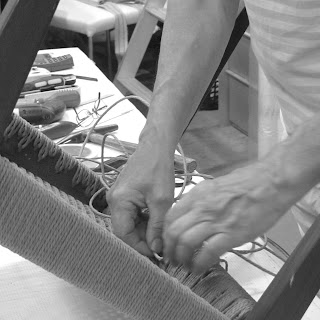Repairing the Future - A place for craft
Waste is the catastrophic result of a consumerist society. It is the most visible manifestation of our unsustainable ways of living, yet most of what we continue to design and make is waste. In The Waste Makers, Vance Packard(1) imagines Cornucopia, a city where buildings are made of paper and cars out of plastic, children are issued with lifetime credit cards, and excess products are scrapped straight out of the assembly line to protect the market from an oversupply. The economy runs on a throughput of material, and repair is regarded as unpatriotic, therefore discouraged.
Packard saw the beginnings of a wasteful culture, and now this dystopian city of the future with its planned obsolescence is very much our reality. But we don’t equally share the effects of this culture. The harm to environment and societies is concealed from many of us because the plants, factories and refuse tips have been hidden from our view. This unequal distribution of the destruction of our wasteful lives is outright unethical. Don’t we already have an antidote to these destructive forces? It is possible, but it requires two related practices to become widespread. Firstly, for the new things we need, we design and make them according to their durability need: things that must be disposable, to be made with modest materials and recyclable; and everything else, to be made with durability and repairability.Secondly, since the future is already filled with the things in the present, we deal with what is already here. This means repairing and re-using everything we have.It follows that the skills and knowledge needed for these practices to become common are also already here. Craft making is centred on knowledge of materials and processes, and skills of making-do and improvising. Through craft practices we can make things durable and repairable, and lead a culture of repair.
Furthermore, while a craftsperson uses tools and machines, they are largely reliant on their own labour. Where technology’s exponential forces cause waste at alarming speed, making by hand is a time-consuming task, giving it its characteristic of sustainability.The future is already filled with today’s and tomorrow’s waste. It is up to us to support Craft Futures, with its focus on sustainable use of skills and knowledge. By starting this today, we are repairing our future.
Packard saw the beginnings of a wasteful culture, and now this dystopian city of the future with its planned obsolescence is very much our reality. But we don’t equally share the effects of this culture. The harm to environment and societies is concealed from many of us because the plants, factories and refuse tips have been hidden from our view. This unequal distribution of the destruction of our wasteful lives is outright unethical. Don’t we already have an antidote to these destructive forces? It is possible, but it requires two related practices to become widespread. Firstly, for the new things we need, we design and make them according to their durability need: things that must be disposable, to be made with modest materials and recyclable; and everything else, to be made with durability and repairability.Secondly, since the future is already filled with the things in the present, we deal with what is already here. This means repairing and re-using everything we have.It follows that the skills and knowledge needed for these practices to become common are also already here. Craft making is centred on knowledge of materials and processes, and skills of making-do and improvising. Through craft practices we can make things durable and repairable, and lead a culture of repair.
Furthermore, while a craftsperson uses tools and machines, they are largely reliant on their own labour. Where technology’s exponential forces cause waste at alarming speed, making by hand is a time-consuming task, giving it its characteristic of sustainability.The future is already filled with today’s and tomorrow’s waste. It is up to us to support Craft Futures, with its focus on sustainable use of skills and knowledge. By starting this today, we are repairing our future.
1. Packard, V. (1960). The waste makers. Middlesex, England: Penguin Books Ltd, p. 15-20.
Image credit: Nora Kinnunen


Comments
Post a Comment